-
 Art of Wellness Acupuncture & Traditional Chinese Medicine (TCM)11704 Wilshire Blvd, Suite 295, Los Angeles, CA, 90025
Art of Wellness Acupuncture & Traditional Chinese Medicine (TCM)11704 Wilshire Blvd, Suite 295, Los Angeles, CA, 90025
myartofwellness@gmail.com310-451-5522 Office Hours
MonClosedTue7:30 am --4 pmWed7:30 am --4 pmThu7:30 am -- 4 pmFri7:30 am -- 4 pmSat7:30 am -- 4 pmSunClosedOur office opens from Tuesdays to Saturdays 7:30 am to 4 pm, will be closed on Memorial day, Independent day, Labor day, Thanksgiving day, Christmas and New year.
-
Recent Posts
- How to Treat Rosacea With Acupuncture and TCM
- How to Treat Perioral Dermatitis With Acupuncture and TCM
- Lymphatic Drainage With Acupuncture and TCM
- How to Treat Turf Toe With Acupuncture
- How to Treat Nerve Pain With Acupuncture and TCM
- How to Treat Watery Eyes With Acupuncture and TCM
- How to Treat Ovarian Cysts With Acupuncture and TCM
- How to Treat Dystonia With Acupuncture and TCM
- Can Acupuncture Help Bad Breath?
- How to Treat Atopy with Acupuncture and TCM
- Plantar Fasciosis Treatment With Acupuncture and TCM
- How to Protect Yourself When Air Quality Is Poor
- How to Treat Spinal Headache With Acupuncture and TCM
- How to Treat Sarcoidosis With Acupuncture and TCM
- How to Treat Flu With Acupuncture and TCM
- Chinese New Year 2025 Year of the Snake
- Sign up to receive news and updates and get my free report:“The Top 10 Reasons to Try Acupuncture”

July 2025 M T W T F S S 1 2 3 4 5 6 7 8 9 10 11 12 13 14 15 16 17 18 19 20 21 22 23 24 25 26 27 28 29 30 31
Inflammation
How to Treat Splenomegaly (Enlarged Spleen) With Acupuncture and TCM
By Qineng Tan, L.Ac., Ph.D. and Xiaomei Cai, L.Ac., Ph.D.
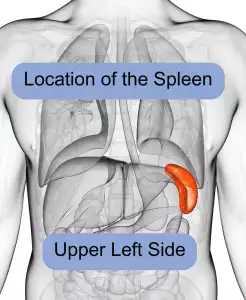
Left side abdominal pain that is tender to the touch? Feeling full after eating a small amount? Signs of anemia, bleeding easily? These may be enlarged spleen symptoms. Acupuncture and TCM can help with splenomegaly, along with spleen function and swollen spleen symptoms.
Splenomegaly is the medical term for an enlarged spleen. In conventional medical wisdom, the spleen is an organ that stores and filters blood, regulating the amounts of red blood cells, white blood cells, and platelets that are in circulation.
The spleen removes waste products and damaged blood cells from the bloodstream. It also produces antibodies (white blood cells) that fight germs and infection.
The spleen is located inside the left side of the ribcage, just above the stomach. Usually, the spleen is about the size of your fist—on average, about 12 centimeters long.
People often will not be aware of an enlarged spleen, but in some cases, there will be noticeable signs, such as pain in upper left abdomen and feeling “full.”
Spleen function is considered very important for overall health and happiness in TCM. Acupuncture treatment and Chinese herbs can provide an adjunct or alternative treatment for enlarged spleen.
Enlarged Spleen Symptoms
The most common swollen spleen symptoms include:
- Left upper quadrant pain, pain behind left ribs, left abdominal pain (upper abdomen), left side abdominal pain
- Pain that radiates to the left shoulder
- Feeling full even when you haven’t eaten
- Feeling full after eating only a small amount
- Anemia, low red blood cell count
- Bruise easily
- Bleeding easily
- Fatigue
- Catch colds frequently or suffer from other infections often
If you experience tenderness or serious left abdominal pain and feel dizzy, and/or have a rapid heartbeat, it is important to seek care immediately. These could be signs of ruptured spleen, which can lead to internal bleeding that could be life-threatening.
Enlarged Spleen Causes

There are several different conditions that can cause the spleen to become enlarged. What causes a big spleen, or should we say, bigger spleen?
Some of the health issues that can cause splenomegaly include:
- Liver cirrhosis, or other liver disease
- Viral hepatitis, Mononucleosis, or other viral infections
- Different types of hemolytic anemia
- Blood cancers, including: polycythemia vera and other myeloproliferative neoplasms, Leukemia, lymphoma, Hodgkin’s disease
- Blood clot near the spleen or liver
- Autoimmune disorders, including Lupus or Sarcoidosis, or rheumatoid arthritis (RA)
- Malaria, or other parasitic infections
- Bacterial infections
- Gaucher disease or Niemann-Pick disease
Medical Treatment for Enlarged Spleen
The treatment of splenomegaly in Western medicine primarily depends on addressing the underlying cause of the condition.
When an enlarged spleen is caused by infections like viral hepatitis or mononucleosis, the focus is typically on treating the infection itself. Antiviral medications may be prescribed to manage viral hepatitis, while mononucleosis, caused by the Epstein-Barr virus, usually requires supportive care. Rest, hydration, and over-the-counter pain relievers like acetaminophen or ibuprofen may be recommended to alleviate symptoms. In some cases, particularly when there’s a risk of the spleen rupturing, patients may be advised to avoid contact sports or strenuous activities.
For blood disorders that cause an enlarged spleen, treatment typically involves managing the specific blood condition. For example, in hemolytic anemia, where red blood cells are destroyed faster than they can be produced, treatments may include blood transfusions, corticosteroids to suppress the immune system, or medications like rituximab.
In conditions like polycythemia vera, where there’s an overproduction of red blood cells, treatment might involve phlebotomy (removing blood from the body) to reduce blood volume, or medications like hydroxyurea to suppress the bone marrow’s production of blood cells.
When liver disease such as cirrhosis is the cause of splenomegaly, the treatment approach focuses on managing the liver condition. Cirrhosis management may include lifestyle modifications such as reducing alcohol intake, using medications to control liver damage, and managing complications like portal hypertension. In severe cases, a liver transplant may be considered. Controlling the liver condition can help reduce spleen enlargement.
In cases where the spleen enlargement is due to cancers like leukemia or lymphoma, treatment usually involves chemotherapy, radiation therapy, or targeted drug therapies to address the cancer. The goal is to reduce the size of the spleen by shrinking the cancerous cells that are contributing to its enlargement. In certain situations where the spleen is significantly enlarged and causing symptoms, or if it’s not responding to other treatments, splenectomy (surgical removal of the spleen) might be recommended.
Autoimmune disorders like lupus or rheumatoid arthritis can also cause splenomegaly. Treatment for these conditions often involves immunosuppressive medications such as corticosteroids, methotrexate, or biologic agents that target specific parts of the immune system. By controlling the underlying autoimmune disorder, the symptoms associated with spleen enlargement can often be managed effectively.
When does an enlarged spleen need to be removed?
In some cases, if the spleen is severely enlarged or if it’s causing significant symptoms or complications (such as a high risk of rupture), a splenectomy may be considered. This surgical procedure involves removing the spleen entirely. While splenectomy can relieve symptoms and prevent complications, it also has long-term implications, as the spleen plays an important role in the immune system. Patients who undergo splenectomy may require vaccinations and prophylactic antibiotics to reduce the risk of infections.
Unless the spleen is ruptured, in most cases, a splenectomy is not necessary. Trying a holistic approach with TCM and acupuncture may be able to help relieve symptoms and improve spleen function.
Can Acupuncture Help Enlarged Spleen?
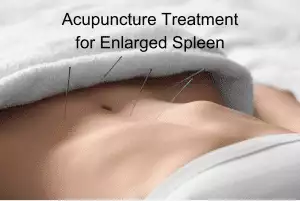
Traditional Chinese Medicine takes a different few of key organs and organ systems than we are used to in modern medicine.
In TCM, the spleen is considered vital to the digestion of food, working in harmony with the stomach. The spleen is also partially responsible for the transport of blood and water throughout the body, delivering nutrition to the muscles.
The spleen is also vital to the proper excretion of waste. When there is a buildup of excessive fluids or “dampness” in the body, it is often due to a deficiency of the spleen.
Fatigue and a sense of fullness after eating are considered signs of spleen deficiency, which can affect whether or not other organs are getting the nutrition they need.
Problems with the spleen may also be related to the liver and/or the stomach, so the acupuncture practitioner will carefully look at all of a patient’s presenting symptoms to determine the appropriate diagnostic pattern and course of treatment.
In TCM, organs are related to certain emotions, and the spleen is connected to anxiety. Thus, worrying, overthinking, and other manifestations of anxiety are believed to negatively impact the spleen.
TCM treatment to help strengthen spleen function may focus on clearing stagnation and dampness, and improving circulation of blood and Qi. Your acupuncture provider can develop a course of treatment with acupuncture and herbs to address the underlying causes of an enlarged spleen, while also helping to relieve any symptoms of splenomegaly.
Acupuncture for Enlarged Spleen Near Me in West Los Angeles
If you are experiencing enlarged spleen symptoms, acupuncture and TCM offer holistic approaches that can support spleen function and address the root causes of various health issues. At Art of Wellness, our experienced practitioners can help tailor a treatment plan to your unique needs. Contact us today to learn more about how TCM can benefit your health and well-being.
*This article is for education from the perspective of Traditional Chinese Medicine only. The education provided by this article is not approved by FDA to diagnose, prevent, treat and cure human diseases. It should not stop you from consulting with your physician for your medical conditions. Traditional Chinese Medicine is based on Qi, which is an invisible force that usually cannot be observed by modern science. Because science focuses on testing ideas about the natural world with evidence obtained through observation, these aspects of acupuncture can’t be studied by science. Therefore acupuncture and Chinese herbs are often not supported by double-blind, randomized trials, and they are considered alternative medicine therapies in the United States.
How to Treat Shin Splints With Acupuncture and TCM
By Qineng Tan, L.Ac., Ph.D. and Xiaomei Cai, L.Ac., Ph.D.
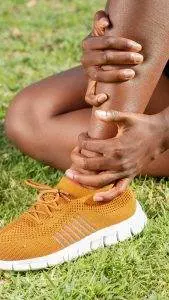
Shin pain, especially during or after exercise? Tenderness and swelling around the shin bone? These may be signs of shin splints, or a shin strain. Acupuncture and TCM can provide shin splints treatment.
Shin splints, also known as medial tibial stress syndrome (MTSS), are a common condition characterized by pain along the inner edge of the shinbone (tibia). This discomfort typically occurs during or after exercise, particularly activities that involve running, jumping, or repetitive stress on the legs.
Shin splints are often attributed to overuse or excessive strain on the muscles, tendons, and bone tissue of the lower leg. This condition involves stress to the soft tissues that causes them to become swollen and hard.
Shin splints pain can be similar to compartment syndrome symptoms, but these are two distinctly different conditions. Compartment syndrome occurs when swelling in the calf area causes a blockage of blood flow to the lower leg. This usually happens due to an injury (acute compartment syndrome) or extreme exertion (chronic exertional compartment syndrome) and causes a severe lack of oxygen in the area. Compartment syndrome usually causes severe pain, sometimes with a tingling or burning sensation, and requires medical attention.
What Causes Shin Splints?

Several factors can contribute to the development of shin splints. One of the primary causes is repetitive stress or overloading of the leg muscles, particularly those responsible for dorsiflexion (lifting the foot upwards) and supporting the arch of the foot. This can occur due to sudden increases in activity level, such as starting a new exercise regimen or intensifying training too quickly, without allowing adequate time for the body to adapt and recover.
Some people may be more prone to developing shin splints because of issues like flat feet, overpronation (excessive inward rolling of the foot), and muscle imbalances in the lower limbs can place additional strain on the shinbone and surrounding soft tissues, increasing the risk of injury.
Wearing footwear with insufficient cushioning or support, running on hard or uneven surfaces, and running downhill or on inclined terrain can all exacerbate the stress on the lower legs and contribute to the development of shin splints. Additionally, factors such as tight calf muscles, weak shin muscles, and not warming up or stretching before exercise can further increase susceptibility to this condition.
Taking care to stretch and warm up before working out, wearing shoes with enough support, and gradually increasing intensity of training can help prevent shin splints.
However, runners and athletes who play basketball or soccer are likely to experience shin splints when they are training and competing.
Shin splints treatment generally requires time and patience. Acupuncture can provide pain relief and help speed recovery from shin splints.
Top 10 Signs and Symptoms of Shin Splints
These signs and symptoms may vary in severity and duration depending on the individual and the underlying causes of shin splints.
- Pain along the inner edge of the shinbone (tibia), typically felt during or after physical activity.
- Tenderness and soreness along the shinbone, especially upon palpation or pressure.
- Swelling or inflammation of the lower leg, often localized to the area of pain.
- Dull, aching pain that may worsen with activity and subside with rest.
- Discomfort that initially occurs at the beginning of exercise but may progress to persist throughout the activity.
- Pain that gradually increases in intensity or becomes more widespread over time.
- Pain that may be accompanied by a feeling of tightness or stiffness in the muscles of the lower leg.
- Pain that persists even after cessation of activity and may interfere with daily activities.
- Possible development of small lumps or bumps along the inner border of the shinbone due to inflammation or irritation of the surrounding tissues.
- Pain that improves with rest but recurs upon resuming physical activity, especially activities that involve impact or weight-bearing on the legs.
Shin Splints Treatment
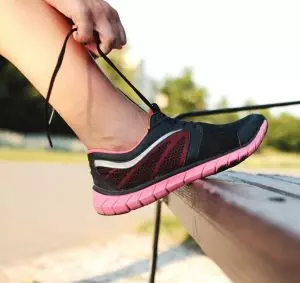
Conventional treatment of shin splints usually involves rest and over the counter pain relief. Typically, a doctor will recommend that a person with shin splints limits their exercise to low-impact activities. Icing the area several times per day is advised.
Acupuncture treatment for medial tibial stress syndrome can help relieve shin pain quickly.
One case study showed that a patient who had been suffering from shin splints for six weeks got pain relief after one session of acupuncture treatment, and at a four week follow, was still pain-free.
Can Acupuncture Help Shin Splints?
Acupuncture treatment helps with the healing of soft tissue injuries by increasing circulation to the area, relieving inflammation, and aiding in the release of endorphins for pain relief. It does this by activating Qi to move blood and energy more efficiently through the body.
One study of three groups of athletes with shin splints looked at patients who received conventional sports medicine, patients who received acupuncture, and patients who received both. The groups who received acupuncture treatment reported significantly lower pain levels and used less NSAIDs than those who did not receive acupuncture.
Acupuncture Near Me for Shin Splints in West Los Angeles
Acupuncture is an effective modality for treating many kinds of repetitive stress injuries and nerve pain conditions, including sprained ankles, Baker’s cyst, tendinitis, and carpal tunnel syndrome. Dr. Tan has over 35 years of experience helping patients find pain relief and improved mobility through treating all kinds of orthopedic and musculoskeletal conditions. While each case is unique, it is possible to get pain relief quickly with TCM treatment, including acupuncture, electro-acupuncture, therapeutic massage like Tui Na, topical herbal patches, and herbal ointments. If you are in pain and need to heal quickly to get back to your regular activities, acupuncture can help.
*This article is for education from the perspective of Traditional Chinese Medicine only. The education provided by this article is not approved by FDA to diagnose, prevent, treat and cure human diseases. It should not stop you from consulting with your physician for your medical conditions. Traditional Chinese Medicine is based on Qi, which is an invisible force that usually cannot be observed by modern science. Because science focuses on testing ideas about the natural world with evidence obtained through observation, these aspects of acupuncture can’t be studied by science. Therefore acupuncture and Chinese herbs are often not supported by double-blind, randomized trials, and they are considered alternative medicine therapies in the United States.
How to Treat Costochondritis With Acupuncture and TCM
By Qineng Tan, L.Ac. Ph.D. and Xiaomei Cai, L.Ac., Ph.D.

Chest pain? Rib pain, sternum pain? These can be costochondritis symptoms, caused by inflammation of the cartilage that connects the ribs to the sternum. Acupuncture and TCM can provide costochondritis treatment to relieve pain and inflammation.
Costochondritis is a pain condition caused by inflammation of cartilage in the rib cage. It can be scary, because the pain can feel like a heart attack or a symptom of heart disease.
It is quite common for people who are experiencing costochondritis pain to visit the emergency room complaining of chest pain. Almost 10% of ER visits are related to chest pain symptoms, and a significant number of those turn out to be related to something other than heart problems.
Sometimes called “chest wall pain syndrome,” or costosternal syndrome, costochondritis is considered a syndrome because it presents as a set of symptoms that often does not have a clear cause.
Possible causes of costochondritis include:
- Trauma or injury to the chest or ribs
- Persistent cough
- Repeated bouts of vomiting
- Chest or lung infection
- Allergies that affect the lungs
- Fibromyalgia
- Tietze syndrome
Suddenly doing some kind of heavy labor or intense workout that you’re not used to, that causes you to be winded, could cause inflammation of the chest. Playing contact sports in which you may be tackled or collide with another player or get hit hard with a ball in the chest could also cause costochondritis.
Tietze syndrome is a rare condition in which the cartilage connecting the ribs to the breastbone becomes inflamed and swollen. With Tietze syndrome, the pain and swelling in the chest is usually higher up, around the second and third ribs.
Costochondritis pain usually is felt more on the left side of the chest, radiating outward, and there isn’t any swelling involved.
Rib pain may be exacerbated when lying down, which can make it difficult to sleep comfortably.
Costochondritis is most commonly experienced by people in middle age (40-50s), but it can occur in children and adolescents, as well as adults.
In most cases, costochondritis is temporary. However, costochondritis pain can limit your activities and be debilitating for weeks, or even months. One study showed that up to a third of adults reported pain persisting beyond a year.
Acupuncture has been shown to help alleviate costochondritis pain, often in a matter of weeks.
Costochondritis Symptoms
Costochondritis pain can range anywhere from a slight tenderness to severe chest pain. In mild cases, the pain may go away in a matter of days, but in other cases, the pain can become serious.
Symptoms of costochondritis include:
- Sharp chest pain
- Chest pressure, chest ache, tenderness in breastbone
- Pain on the left side of chest, to the left of the breastbone
- Rib pain in more than one rib
- Pain radiating to shoulders and/or arms
- Chest pain when coughing, sneezing, or taking a deep breath
- Pain in chest when reaching up or twisting the torso
- Rib pain when lying down
- Pain when hugging someone
- Pain when putting on a seatbelt
Medical Diagnosis and Costochondritis Treatment

Other than the doctor palpating the area around your breastbone and ribs, there is no specific test to determine if you have costochondritis.
Chest pain can be an indicator of a variety of health conditions, including heart problems or lung problems, so it is always important to get it checked out with a healthcare professional. They will rule out other problems by ordering an EKG or chest X-ray in order to get to a diagnosis of costochondritis.
Treatment will consist of recommendations for ways to alleviate pain. Over-the-counter nonsteroidal anti-inflammatory drugs (NSAIDs) such as ibuprofen (Advil, Motrin IB) or naproxen (Aleve) can help reduce inflammation and pain.
In cases of more severe or persistent pain, a doctor may prescribe stronger pain medications such as prescription-strength Motrin or muscle relaxers.
Applying heat or cold packs to the affected area can help reduce inflammation and alleviate pain. Some individuals find relief by alternating between heat and cold therapy.
In cases where pain is severe and not responding to other treatments, corticosteroid injections directly into the affected area may provide temporary relief by reducing inflammation.
Acupuncture treatment is a great way to relieve pain and reduce inflammation, without the side effects that can result from using pain medications or steroids for several weeks or months.
Can Acupuncture Help Costochondritis?
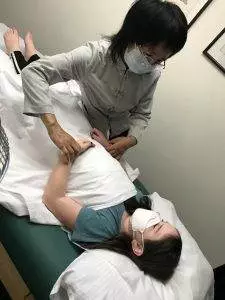
Acupuncture has been used for many centuries to treat pain and inflammation. Now, research is able to show how and why this modality is able to regulate inflammatory responses. Acupuncture affects the nerve signaling that produces hormones like dopamine and can reduce the production of cytokine storms. This is why acupuncture can help relieve inflammation and chest pain of costochondritis.
In TCM theory, pain and inflammation are usually considered to occur because of stagnation, or stasis, of blood and/or Qi (life force energy). The same symptoms can occur in different individuals because of different imbalances in the organs systems that are causing the blockages and different pathogenic factors, such as excess heat, dampness, etc.
Costochondritis inflammation can occur due to dampness and stagnation of Qi in the liver, spleen, and/or kidney systems. Depending on each patient’s specific situation, your acupuncturist will choose acupoints to open channels, clear dampness, heat, and phlegm. This allows for Qi and blood to flow smoothly again, cooling down the inflammation and relieving pain.
One case study of six women who were treated for costochondritis pain with acupuncture found that all patients reported improvement and were able to discontinue taking OTC pain medications.
One pediatric study looked at young students suffering from costochondritis; they were missing school, limiting their sports, dance, and work, and having trouble sleeping. After 4-6 weeks of acupuncture treatment, these patients reported a significant reduction in pain, and were able to resume their usual activities.
Not only is acupuncture treatment effective for relief of costochondritis pain; it can work quickly. In many cases, patients feel better after one or two treatments.
Acupuncture Near Me for Costochondritis in Los Angeles Area
Dr. Tan and Dr. Cai of Art of Wellness Acupuncture in West L.A. have been helping treat pain conditions for over 35 years. Our office is a home away from home where patients are able to relax and find relief from pain and inflammation. If you or someone you love is experiencing chest pain due to costochondritis, please do not hesitate to come in for a consultation.
*This article is for education from the perspective of Traditional Chinese Medicine only. The education provided by this article is not approved by FDA to diagnose, prevent, treat and cure human diseases. It should not stop you from consulting with your physician for your medical conditions. Traditional Chinese Medicine is based on Qi, which is an invisible force that usually cannot be observed by modern science. Because science focuses on testing ideas about the natural world with evidence obtained through observation, these aspects of acupuncture can’t be studied by science. Therefore acupuncture and Chinese herbs are often not supported by double-blind, randomized trials, and they are considered alternative medicine therapies in the United States.
How to Treat Ankylosing Spondylitis With Acupuncture and TCM
By Qineng Tan, L.Ac., Ph.D. and Xiaomei Cai, L.Ac., Ph.D.

Low back pain, morning stiffness, hip pain? Fatigue, losing weight, poor vision, skin rashes? These can all be signs of Ankylosing Spondylitis (AS). Ankylosing Spondylitis is a type of autoimmune arthritis. Acupuncture can help relieve Ankylosing Spondylitis symptoms like lower back pain.
Ankylosing spondylitis is a chronic inflammatory arthritis condition that most often affects the spine, usually the lower back and pelvis is an inflammatory disease; the primary symptom is inflammation in the sacroiliac joints, the joints where the base of the spine (the ilium) meets the pelvis (the sacrum).
Similar to rheumatoid arthritis (RA), ankylosing spondylitis is an arthritic condition triggered by a person’s immune system mistakenly attacking healthy tissues. Arthritis generally refers to pain and swelling in joint tissues.
Ankylosing spondylitis can also affect the hips, knees, shoulder joints, and/or the ribcage. When the body tries to heal affected bones, extra bone tissue begins to grow. This new bone growth is what causes joint stiffness and lack of flexibility. When the ribs are affected, it can restrict normal breathing.
Ankylosing spondylitis can, over time, weaken bones to the extent that they begin to collapse; these compression fractures can ultimately lead to curvature of the spine and a stooped posture. These fractures of the vertebrae can potentially affect the spinal cord and nerves.
“Ankylosis” is a term for the stiffening and fusion of bones. A “fused spine” can be the eventual outcome of Ankylosing spondylitis.
AS can also cause inflammation in the GI tract, causing gastrointestinal symptoms like diarrhea. In this sense, it is a type of inflammatory bowel disease (IBD).
In some cases, ankylosing spondylitis can cause eye inflammation, leading to vision problems like blurred vision, sensitivity to light, and painful eyes.
AS can also cause inflammation in the heart, which affects the function of the aortic valve and increases risk of heart disease.
As with other autoimmune disorders, modern medicine research has yet to discover what causes Ankylosing Spondylitis. Some gene mutations have been linked to ankylosing spondylitis, which is sometimes called axial spondyloarthritis.
Medical treatment for ankylosing spondylitis helps manage symptoms and slow the progression of the disease.
Acupuncture is widely recognized as an effective adjunct treatment for ankylosing spondylitis that can help reduce pain and improve mobility.
Top 10 Ankylosing Spondylitis Symptoms
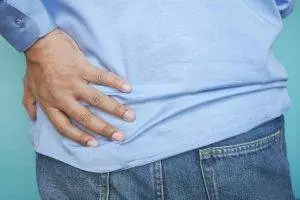
The initial onset of symptoms of ankylosing spondylitis often includes episodes of lower back pain and stiffness or hip pain, which then may get more severe over time. But symptoms can vary widely from person to person, depending on which parts of the body are affected.
Symptoms of Ankylosing Spondylitis include:
- Persistent lower back pain and stiffness, typically worse in the morning and after periods of inactivity; back pain that improves with movement and exercise
- Pain and stiffness that radiate from the lower back to the buttocks, hips, and thighs, reduced flexibility and range of motion in the spine
- Hip pain, shoulder pain, chest pain, rib pain, knee pain, and/or ankle pain
- Difficulty taking deep breaths due to stiffness in the chest and ribcage
- Fatigue
- Bony fusion of vertebrae, leading to a stooped posture and loss of spinal mobility
- Eye inflammation (uveitis) causes eye pain, sensitivity to light, and blurred vision
- Loss of appetite, weight loss
- Psoriasis, skin rash
- Abdominal pain, diarrhea
There is usually a gradual progression of AS symptoms over time, potentially leading to severe spinal deformity and disability.
Conventional treatment, with acupuncture and TCM used as a complementary treatment, can be helpful for symptomatic relief.
Ankylosing Spondylitis Treatment
While there is no cure for AS, conventional medical treatments aim to manage symptoms, prevent complications, and improve quality of life for individuals with the condition.
NSAIDs such as ibuprofen, naproxen, and celecoxib are commonly used to reduce pain and inflammation associated with AS. They can help relieve symptoms and improve mobility, particularly during flare-ups.
Disease-Modifying Antirheumatic Drugs (DMARDs) like sulfasalazine and methotrexate may be prescribed to slow the progression of AS and reduce inflammation. These medications work by suppressing the immune system’s abnormal response, which contributes to inflammation, the formation of extra bone tissue, and damage to the joints.
Biologic drugs, such as tumor necrosis factor (TNF) inhibitors like adalimumab, etanercept, and infliximab, target specific components of the immune system involved in inflammation. They are often prescribed for individuals with moderate to severe AS who do not respond adequately to NSAIDs or DMARDs.
Physical therapy can play a crucial role in the management of AS by helping to improve flexibility, posture, and range of motion. Exercise programs tailored to the individual’s needs can help strengthen muscles, reduce pain, and maintain spinal mobility.
Orthopedic interventions, such as braces and orthotics, may be recommended to support proper posture and prevent spinal deformities caused by AS. In severe cases, surgical procedures like spinal fusion may be considered to stabilize the spine and alleviate pain.
Individuals with AS require regular monitoring by healthcare providers to assess disease activity, monitor medication effectiveness, and detect any complications early. Adjustments to treatment plans may be necessary based on disease progression and individual response to therapy.
Can Acupuncture Help Ankylosing Spondylitis?
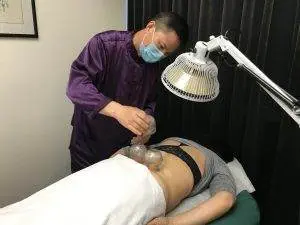
Acupuncture and moxibustion have been used for centuries to help relieve joint pain and stiffness due to inflammation. In Chinese, conditions that might involve bone fusion are called “zhu jie yang,” which means “bamboo spine.”
According to TCM theory, the bones are nourished by the kidney system; we observe that the formation of AS symptoms occurs along the Kidney Meridian and the Governing Vessel meridian. Weakness in bones may be due to deficiency of kidney Qi and blockage of the Governing Vessel.
Painful areas arise when there are blockages in Qi. Blockages occur due to pathogenic forces of phlegm accumulation, cold, and dampness.
Acupuncture treatment, herbs, and moxibustion may be used to strengthen the kidneys, address kidney yang deficiency, and clear dampness and wind from the channels.
One study found that patients who were diagnosed with ankylosing spondylitis and kidney yang deficiency and were given acupuncture treatment and moxibustion focused on the Governing Vessel meridian experienced significant reduction of pain.
Moxibustion warms and invigorates yang energy and can help improve immune function. In the case of AS, this treatment protocol can help slow the progression of the disease, preventing inappropriate bone formation and reducing inflammatory responses.
A review of 26 studies that involved moxibustion treatment as an adjunct therapy for ankylosing spondylitis. The conclusion was that patients who had moxibustion in addition to conventional treatment fared better than those who did not receive moxibustion.
The British Acupuncture Council recommends TCM treatment for AS, as it has been shown to be effective at relieving back pain, without side effects.
One study of patients with ankylosing spondylitis who received acupuncture treatment and Chinese herb supplements, including herbal soak baths, found that people experienced pain relief and functional improvement.
A study that looked at 22 patients who received cupping therapy along with acupuncture and infrared heat lamps. The vast majority of the patients reported significant improvement in their pain symptoms.
Tuina therapeutic massage may also be helpful for helping to improve mobility and circulation.
A review of studies showed that acupuncture offers “unique advantages” in the treatment of ankylosing spondylitis, including localized pain relief, reduced inflammation, improvement of joint mobility, prevention of spinal deformity, and overall better quality of life.
Acupuncture Near Me for Ankylosing Spondylitis in West Los Angeles
Acupuncture can be an effective complementary treatment for many autoimmune disorders, including Sjogren’s disease, Lupus, as well as difficult-to-treat chronic pain conditions like fibromyalgia and complex regional pain syndrome (CRPS). Dr. Tan and Dr. Cai at Art of Wellness in West L.A. have over 35 years of experience helping patients find relief from all kinds of musculoskeletal pain.
*This article is for education from the perspective of Traditional Chinese Medicine only. The education provided by this article is not approved by FDA to diagnose, prevent, treat and cure human diseases. It should not stop you from consulting with your physician for your medical conditions. Traditional Chinese Medicine is based on Qi, which is an invisible force that usually cannot be observed by modern science. Because science focuses on testing ideas about the natural world with evidence obtained through observation, these aspects of acupuncture can’t be studied by science. Therefore acupuncture and Chinese herbs are often not supported by double-blind, randomized trials, and they are considered alternative medicine therapies in the United States.
How To Treat Baker’s Cyst With Acupuncture and TCM
By Qineng Tan, L.Ac., Ph.D. and Xiaomei Cai, L.Ac., Ph.D.

Swelling behind knee, lump behind knee, pain and swelling behind knee, knee stiffness? These can be Baker’s cyst symptoms. A Baker’s cyst in knee joint occurs when swelling in the knee forms a fluid-filled sac. Acupuncture treatment can help relieve Bakers cyst knee symptoms like knee pain and stiffness.
A Baker cyst, also known as a popliteal cyst, or synovial cyst, is a fluid-filled growth that develops in the back of the knee joint. In some cases, a Baker’s cyst causes knee pain, stiffness, and swelling; in other cases, there may be no Baker’s cyst signs and symptoms at all.
What causes Baker’s cyst? Usually, it is due to a knee injury, such as a cartilage tear, or arthritis in the knee joint. These types of problems cause inflammation in the knee, which can lead to the production of more synovial fluid than usual.
Synovial fluid is a thick, clear substance, similar to egg whites in consistency, that is present in the joints of the body to help lubricate their movements. It is produced by the synovium, a sort of bubble that surrounds joints like the knees, elbows, shoulders, and hips.
When the synovium becomes swollen and inflamed, due to injury or overuse of the joint, it may produce excess synovial fluid. In the case of a Baker’s cyst, the synovial fluid can build up in the knee joint, and form a bump, lump, or growth in the back of the knee.
People who have a history of knee injury, osteoarthritis, or rheumatoid arthritis may be more prone to developing Baker’s cysts.
Bakers cyst treatment is usually only indicated if a person is experiencing significant pain or limitation of movement. Acupuncture treatment can provide an adjunct or alternative Baker’s cyst therapy to help promote healing and relieve Baker’s knee symptoms.
Top 5 Baker’s Cyst Symptoms

Photo by Jenny Hill on Unsplash
Many people have a baker’s cyst knee without realizing it. If there is no pain, a person may not notice the lump behind knee.
Baker’s cyst signs and symptoms include:
- Knee pain, pain in the back of the knee
- Knee stiffness, stiff knee joint, especially when straightening the leg
- Swollen knee, swelling in knee joint
- Swelling goes away when knee is bent
- Pain and stiffness are worse after standing for a long time
More severe baker’s cyst symptoms could include redness and swelling, as the cyst gets larger.
In some cases, a baker’s cyst can rupture. If this happens, there may be swelling, redness, and a warm sensation in the calf area. Rupture of a baker’s cyst could cause pain or numbness in the calf, lack of blood flow to the lower leg, as the ruptured cyst could trap a nerve or artery in the knee or lower leg.
In extreme cases, a ruptured Baker’s cyst could lead to compartment syndrome, which could cause intense pain, foot drop, edema in the lower leg, and possibly, even an inability to move the foot or toes. If you believe your Baker’s cyst has ruptured, you should seek emergency care.
While, in most cases, a Baker’s cyst will eventually go on on its own, it is best to get a diagnosis and discuss your options. Acupuncture and TCM offer treatment of Baker’s cysts that is non-invasive and can help improve healing and prevent regrowth of the cyst.
Baker’s Cyst Treatment
Baker’s cyst signs and symptoms can be similar to those of a blood clot, or even a tumor. So, while a doctor can often diagnose a Baker’s cyst simply by palpating the area, they may also order imaging tests to be sure.
In many cases, doctors will prescribe over the counter pain medications and allow time for the cyst to go away on its own. You may be advised to limit activities that might aggravate the knee inflammation. Resting and elevating the knee for a few weeks might be recommended.
In some cases, a doctor may give cortisone injections to reduce knee swelling, or perform needle aspiration to drain the fluid from the cyst.
Surgery is generally only suggested in situations in which the knee pain has become chronic and inflammation does not seem to be going away.
Unfortunately, these medical treatments for Baker’s cyst may help bring relief, but it is quite common for the Baker’s cyst to come back again. Acupuncture treatment is not only a good way to bring symptomatic relief, but can help prevent the recurrence of Baker’s cysts.
Acupuncture has long been considered an excellent modality for treating knee pain due to all types of conditions. TCM offers an adjunct or alternative treatment for knee pain, without side effects that can come with pain medications or steroids.
Can Acupuncture Help Baker’s Cyst?
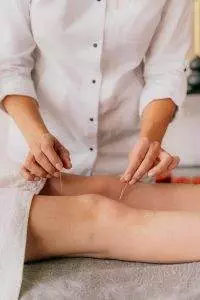
Acupuncture and TCM treatments with Chinese herb formulas have been used for centuries to treat knee injuries of all kinds.
According to TCM theory, arthritis in the knee that causes pain and stiffness is caused by stagnation that blocks the smooth flow of blood and Qi (life force energy). Acupuncture and herbs are used to address the underlying causes of blockages.
Injuries like a torn meniscus in the knee, or damage to the cartilage of the knee are very common, and it is also common for a person who has suffered such an injury to develop a Baker’s cyst later on. Full healing of cartilage can be helped with specific herbs that bring more nutrients to the damaged tissues.
Once a pattern of inflammation has begun, it can be difficult to get the swelling to go away. Small movements can trigger the inflammatory response if the area is not fully healed, and if other lifestyle habits are also causing a person to be prone to inflammation.
Chinese medicine looks at the situation holistically, treating the situation with acupuncture treatment, cupping, herbs, and nutrition, so that overall inflammation is reduced, and swelling and pressure is reduced, as well.
Herbal patches that are applied topically may be used in addition to herbal teas taken internally, to help relieve knee pain and swelling.
Cupping can also be helpful for healing and prevention of Baker’s cysts. One study compared patients with a popliteal cysts who were treated with acupuncture and cupping to patients who were given injections of prednisone. Both groups had high rates of effectiveness in terms of relief from the cysts, but recurrence of Baker’s cyst was significantly lower in the group that received TCM treatment as opposed to steroids.
Acupuncture Near Me for Baker’s Cyst, Los Angeles, CA
If you or someone you know has been suffering from knee pain and stiffness, due to a knee injury, arthritis, or diagnosed with Baker’s cysts on knee, it is worth seeking help from an acupuncturist experienced in working with orthopedic injuries, like Dr. Tan at Art of Wellness in West Los Angeles. TCM treatment for Baker’s cyst and other problems with the knee joint can not only help to relieve pain and increase range of movement; it can help prevent knee pain from coming back in the future.
*This article is for education from the perspective of Traditional Chinese Medicine only. The education provided by this article is not approved by FDA to diagnose, prevent, treat and cure human diseases. It should not stop you from consulting with your physician for your medical conditions. Traditional Chinese Medicine is based on Qi, which is an invisible force that usually cannot be observed by modern science. Because science focuses on testing ideas about the natural world with evidence obtained through observation, these aspects of acupuncture can’t be studied by science. Therefore acupuncture and Chinese herbs are often not supported by double-blind, randomized trials, and they are considered alternative medicine therapies in the United States.